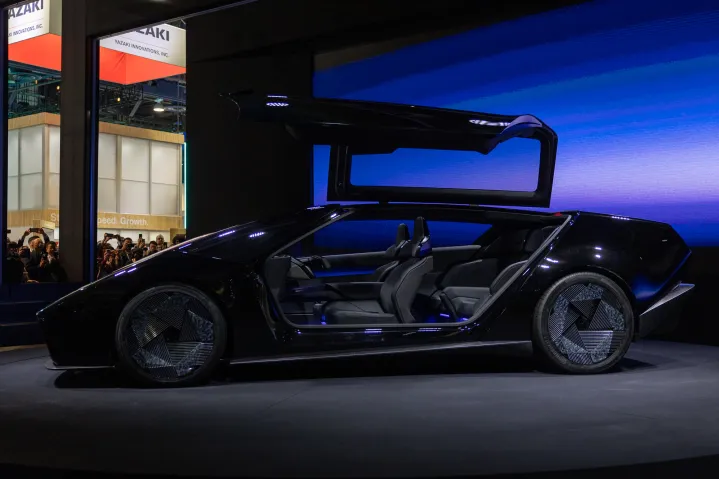- Honda’s Zero Series pioneers a shift from heavy SUVs, presenting lighter and aerodynamic electric vehicles.
- With a commitment to ‘thin,’ ‘light,’ and ‘wise,’ Honda aims for 30 new EVs by 2030, prioritizing sustainability and cutting-edge design.
Honda has announced the Honda Zero, a new global electric vehicle series focusing on creating lighter, more aerodynamic EVs as an alternative to the current trend of heavy SUVs. The first model, the Saloon, will debut in North America in 2026, featuring a sleek design and emphasizing aerodynamics. Another concept, the Space-Hub, showcases a boxier van-like design with potential for use in autonomous shuttle services. Honda’s approach involves a “thin,” “light,” and “wise” philosophy, with a new H-mark logo exclusively for its next-gen EVs. The company aims to introduce 30 new EVs by 2030, targeting 2 million units sold and achieving 100 percent zero-emission auto sales by 2040. Despite setbacks, such as canceling plans with General Motors for affordable EVs, Honda’s Prologue SUV is set to launch in North America this year.
Also read: Nvidia accelerates China’s EV future with innovative driving solutions
Honda’s Zero Series: a paradigm shift towards lighter, aerodynamic electric vehicles redefining the future of sustainable mobility.
Honda’s entry into the electric vehicle (EV) market with the Honda Zero series represents a departure from the prevailing trend of heavy and bulky EVs, particularly in the United States. The company’s emphasis on a “thin,” “light,” and “wise” approach suggests a commitment to developing vehicles that are not only energy-efficient but also prioritize agility and aerodynamics.
The Saloon, as the first model in the Honda Zero series, showcases a sleek design reminiscent of a sedan, with a low, sporty profile that draws inspiration from Formula 1 racing. The emphasis on aerodynamics and a lightweight architecture is a departure from the larger, more robust electric SUVs dominating the current market. This strategic shift may appeal to consumers looking for a different driving experience and a more environmentally conscious option.
In addition to the Saloon, the introduction of the Space-Hub concept hints at Honda’s exploration of diverse vehicle types within the electric mobility space. The boxier van-like design, coupled with the potential for autonomous shuttle services, suggests a forward-looking approach to urban mobility and transportation solutions.
Honda’s collaboration with Sony on the Afeela electric car adds an interesting dimension to its electric vehicle strategy. The connection between the Afeela and the Honda Zero lineup remains unclear, but this partnership could potentially bring innovative technologies and design elements to both brands.
While Honda faces challenges, such as the cancellation of plans with General Motors for affordable EVs and setbacks with GM’s autonomous unit, Cruise, the company’s commitment to introducing 30 new EVs by 2030 reflects a significant investment in the electric future. The Prologue SUV, set to launch in North America, represents a pivotal move in Honda’s efforts to establish a stronger presence in the EV market.Overall, Honda’s vision for the Zero series demonstrates a dedication to innovation, sustainability, and a departure from the status quo in the electric vehicle landscape. The success of this approach will likely depend on consumer reception, technological advancements, and the ability to navigate challenges within the rapidly evolving EV industry.

